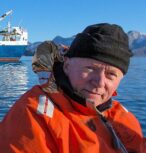DNA reveals the past and future of coral reefs
New DNA techniques are being used to understand how coral reacted to the end of the last ice age in order to better predict how they will cope with current changes to the climate. James Cook Univer

From 2005 to 2022, the main node of the ARC Centre of Excellence for Coral Reef Studies was headquartered at James Cook University in Townsville, Queensland (Australia)








Abstract: The elusive Greenland shark (Somniosus microcephalus) is an understudied and putatively important species in the Arctic. They inhabits large parts of the North Atlantic and Arctic Ocean including Greenland fjords and offshore waters from surface water to depths of more than 2000 meters. Recent studies suggest that the Greenland shark is among the longest living animals in the world, is highly migratory and an active top predator in the arctic ecosystem. Through a series of integrated studies conducted on sharks sampled in Arctic waters, the Old And Cold Project is aiming at exploring the growth pattern and maximum age of Greenland shark, quantify their role and overall importance as a top predator, and investigate the migration pattern throughout their distributional area and several physiological questions. The project aim at integrating several state-of-the-art techniques related to the age determination, migration and comparative physiology in order to accomplish the specified objectives.
Recent commercial interest in Greenland has made advances in biological knowledge and conservation strategies even more urgent, as a population of long-lived sharks must be considered extremely vulnerable to exploitation.
Biography: Dr. John Fleng Steffensen is a marine biologist /fish physiologist working on the physiology of respiration and circulation in fishes, in particular metabolism, temperature acclimation and response s to environmental oxygen changes. He received his PhD in Zoophysiology at Århus University, Denmark (1984) working with Professor Kjell Johnansen, and then continued on a NATO post-doctoral fellowship with Professor Dave Randal. Returning to Denmark, John worked briefly for the Environmental Ministry and then took a faculty position at University of Copenhagen where he has been professor since 2009.
Throughout his career, Dr. Steffensen has pursued his research interests around the globe, on land and sea, in temperate, tropical and Polar Regions, with the diversity of his work matching the diversity of the species he studies. Many of his expeditions are to remote destinations, allowing himto investigate unusual organisms in unusual and extreme habitats. He is also known for developing numerous laboratory instruments for fish physiology. In addition to teaching at his home university, John contributes to international lab and field courses in Scandinavia, Greenland and the USA.
New DNA techniques are being used to understand how coral reacted to the end of the last ice age in order to better predict how they will cope with current changes to the climate. James Cook Univer
A new study on the effects of climate change in five tropical countries has found fisheries are in more trouble than agriculture, and poor people are in the most danger. Distinguished Profess
James Cook University researchers have found brightly coloured fish are becoming increasingly rare as coral declines, with the phenomenon likely to get worse in the future. Christopher Hemingson, a
Researchers working with stakeholders in the Great Barrier Reef region have come up with ideas on how groups responsible for looking after the reef can operate more effectively when the next bleaching
Abstract: As marine species adapt to climate change, their heat tolerance will likely be under strong selection. Individual variation in heat tolerance and its heritability underpin the potential fo
Abstract: The Reef Ecology Lab in KAUST’s Red Sea Research Center explores many aspects of movement ecology of marine organisms, ranging from adult migrations to intergenerational larval dispersal
Abstract: Macroalgal meadows are a prominent, yet often maligned component of the tropical seascape. Our work at Ningaloo reef in WA demonstrate that canopy forming macroalgae provide habitat for ad
Abstract: Sharks are generally perceived as strong and fearsome animals. With fossils dating back at least 420 million years, sharks are not only majestic top predators but they also outlived dinosa
Abstract: Connectivity plays a vital role in many ecosystems through its effects on fundamental ecological and evolutionary processes. Its consequences for populations and metapopulations have been
Abstract: Evolution of many eukaryotic organisms is affected by interactions with microbes. Microbial symbioses can ultimately reflect host’s diet, habitat range, and even body shape. However, how
Abstract: The past few years have seen unprecedented coral bleaching and mortality on the Great Barrier Reef (GBR) but the consequences of this on biodiversity are not yet known. This talk will expl